formerly eScholarship Editions


|
|
|
|
Your search for
'Cultural Anthropology' in subject
found 169 book(s). | Modify Search | Displaying 101 - 120 of 169 book(s) | |
| 101. | 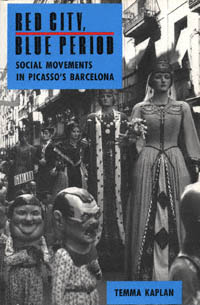 | Title: Red city, blue period: social movements in Picasso's Barcelona Author: Kaplan, Temma 1942- Published: University of California Press, 1992 Subjects: History | Art | European History | Cultural Anthropology | Gender Studies | Art History Publisher's Description: In Red City, Blue Period , Kaplan combines the methods of anthropology and the new cultural history to examine the civic culture of Barcelona between 1888 and 1939. She analyzes the peculiar sense of solidarity the citizens forged and explains why shared experiences of civic culture and pageantry sometimes galvanized resistance to authoritarian national governments but could not always overcome local class and gender struggles. She sheds light on the process by which principles of regional freedom and economic equity developed and changed in a city long known for its commitment to human dignity and artistic achievement.Although scholars increasingly recognize the relationship between so-called high art and popular culture, little has been done to explain what opens the eyes of artists to folk figures and religious art. Kaplan shows how artists like Picasso and Joan Miró, playwright Santiago Russinyol, the cellist Pablo Casals, and the architect Antonio Gaudí, as well as anarchists and other political activists, both shaped and were influenced by the artistic and political culture of Barcelona. [brief] Similar Items |
| 102. | 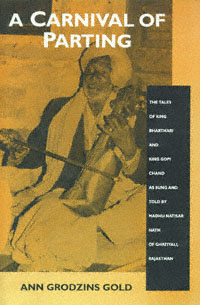 | Title: A carnival of parting: the tales of King Bharthari and King Gopi Chand as sung and told by Madhu Natisar Nath of Ghatiyali, Rajasthan Author: Nath, Madhu Natisar Published: University of California Press, 1993 Subjects: Anthropology | Cultural Anthropology | Folklore and Mythology | Hinduism | South Asia Publisher's Description: Madhu Natisar Nath is a Rajasthani farmer with no formal schooling. He is also a singer, a musician, and a storyteller. At the center of A Carnival of Parting are Madhu Nath's oral performances of two linked tales about the legendary Indian kings, Bharthari of Ujjain and Gopi Chand of Bengal. Both characters, while still in their prime, leave thrones and families to be initiated as yogis - a process rich in adventure and melodrama, one that offers unique insights into popular Hinduism's view of world renunciation. Ann Grodzins Gold presents these living oral epic traditions as flowing narratives, transmitting to Western readers the pleasures, moods, and interactive dimensions of a village bard's performance.Three introductory chapters and an interpretive afterword, together with an appendix on the bard's language by linguist David Magier, supply A Carnival of Parting with a full range of ethnographic, historical, and cultural backgrounds. Gold gives a frank and engaging portrayal of the bard Madhu Nath and her work with him.The tales are most profoundly concerned, Gold argues, with human rather than divine realities. In a compelling afterword, she highlights their thematic emphases on politics, love, and death. Madhu Nath's vital colloquial telling of Gopi Chand and Bharthari's stories depicts renunciation as inevitable and interpersonal attachments as doomed, yet celebrates human existence as a "carnival of parting." [brief] Similar Items |
| 103. |  | Title: Dangerous emotions Author: Lingis, Alphonso 1933- Published: University of California Press, 2000 Subjects: Philosophy | Cultural Anthropology | Literature | Social and Political Thought | Travel Publisher's Description: Alphonso Lingis is an original among American philosophers. An eloquent and insightful commentator on continental philosophers, he is also a phenomenologist who has gone to live in many lands. Dangerous Emotions continues the line of inquiry begun in Abuses , taking the reader to Easter Island, Japan, Java, and Brazil as Lingis poses a new range of questions and brings his extraordinary descriptive skills to bear on innocence and the love of crime, the relationships of beauty with lust and of joy with violence and violation. He explores the religion of animals, the force in blessings and in curses. When the sphere of work and reason breaks down, and in catastrophic events we catch sight of cosmic time, our anxiety is mixed with exhilaration and ecstasy. More than acceptance of death, can philosophy understand joy in dying? Haunting and courageous, Lingis's writing has generated intense interest and debate among gender and cultural theorists as well as philosophers, and Dangerous Emotions is certain to introduce his work to an ever broader circle of readers. [brief] Similar Items |
| 104. | 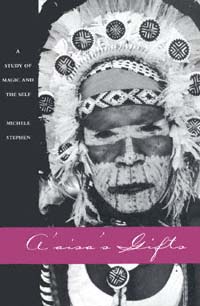 | Title: A'aisa's gifts: a study of magic and the self Author: Stephen, Michele Published: University of California Press, 1995 Subjects: Anthropology | Cultural Anthropology | Folklore and Mythology | Indigenous Religions | Psychology Publisher's Description: Filled with insight, provocative in its conclusions, A'aisa's Gifts is a groundbreaking ethnography of the Mekeo of Papua New Guinea and a valuable contribution to anthropological theory. Based on twenty years' fieldwork, this richly detailed study of Mekeo esoteric knowledge, cosmology, and self-conceptualizations recasts accepted notions about magic and selfhood. Drawing on accounts by Mekeo ritual experts and laypersons, this is the first book to demonstrate magic's profound role in creating the self. It also argues convincingly that dream reporting provides a natural context for self-reflection. In presenting its data, the book develops the concept of "autonomous imagination" into a new theoretical framework for exploring subjective imagery processes across cultures. [brief] Similar Items |
| 105. |  | Title: On holiday: a history of vacationing Author: Löfgren, Orvar Published: University of California Press, 1999 Subjects: History | Anthropology | Travel | American Studies | Cultural Anthropology | Popular Culture | Criminology Publisher's Description: Löfgren takes us on a tour of the Western holiday world and shows how two centuries of "learning to be a tourist" have shaped our own ways of vacationing. We see how fashions in destinations have changed through the years, with popular images (written, drawn, painted, and later photographed) teaching the tourist what to look for and how to experience it. Travelers present and future will never see their cruises, treks, ecotours, round-the-world journeys, or trips to the vacation cottage or condo in quite the same way again. All our land-, sea-, and mindscapes will be the richer for Löfgren's insights. [brief] Similar Items |
| 106. | 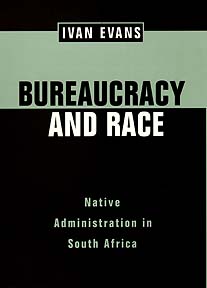 | Title: Bureaucracy and race: native administration in South Africa Author: Evans, Ivan Thomas 1957- Published: University of California Press, 1997 Subjects: African Studies | African History | Sociology | Postcolonial Studies | Cultural Anthropology Publisher's Description: Bureaucracy and Race overturns the common assumption that apartheid in South Africa was enforced only through terror and coercion. Without understating the role of violent intervention, Ivan Evans shows that apartheid was sustained by a great and ever-swelling bureaucracy. The Department of Native Affairs (DNA), which had dwindled during the last years of the segregation regime, unexpectedly revived and became the arrogant, authoritarian fortress of apartheid after 1948. The DNA was a major player in the prolonged exclusion of Africans from citizenship and the establishment of a racially repressive labor market. Exploring the connections between racial domination and bureaucratic growth in South Africa, Evans points out that the DNA's transformation of oppression into "civil administration" institutionalized and, for whites, legitimized a vast, coercive bureaucratic culture, which ensnared millions of Africans in its workings and corrupted the entire state. Evans focuses on certain features of apartheid - the pass system, the "racialization of space" in urban areas, and the cooptation of African chiefs in the Bantustans - in order to make it clear that the state's relentless administration, not its overtly repressive institutions, was the most distinctive feature of South Africa in the 1950s. All observers of South Africa past and present and of totalitarian states in general will follow with interest the story of how the Department of Native Affairs was crucial in transforming "the idea of apartheid" into a persuasive - and all too durable - practice. [brief] Similar Items |
| 107. | 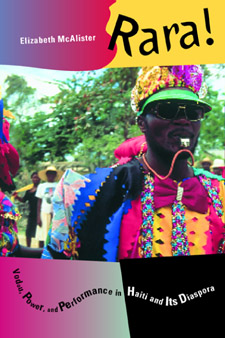 | Title: Rara!: vodou, power, and performance in Haiti and its diaspora Author: McAlister, Elizabeth A Published: University of California Press, 2002 Subjects: Religion | Cultural Anthropology | African American Studies | American Studies | Latin American Studies Publisher's Description: Rara is a vibrant annual street festival in Haiti, when followers of the Afro-Creole religion called Vodou march loudly into public space to take an active role in politics. Working deftly with highly original ethnographic material, Elizabeth McAlister shows how Rara bands harness the power of Vodou . . . [more] Similar Items |
| 108. | 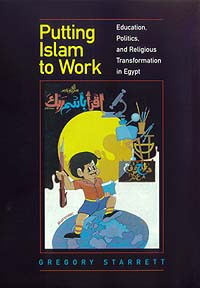 | Title: Putting Islam to work: education, politics, and religious transformation in Egypt Author: Starrett, Gregory 1961- Published: University of California Press, 1998 Subjects: Middle Eastern Studies | Anthropology | Cultural Anthropology | Education | Religion | Islam | Politics Publisher's Description: The development of mass education and the mass media have transformed the Islamic tradition in contemporary Egypt and the wider Muslim world. In Putting Islam to Work , Gregory Starrett focuses on the historical interplay of power and public culture, showing how these new forms of communication and a growing state interest in religious instruction have changed the way the Islamic tradition is reproduced.During the twentieth century new styles of religious education, based not on the recitation of sacred texts but on moral indoctrination, have been harnessed for use in economic, political, and social development programs. More recently they have become part of the Egyptian government's strategy for combating Islamist political opposition. But in the course of this struggle, the western-style educational techniques that were adopted to generate political stability have instead resulted in a rapid Islamization of public space, the undermining of traditional religious authority structures, and a crisis of political legitimacy. Using historical, textual, and ethnographic evidence, Gregory Starrett demonstrates that today's Islamic resurgence is rooted in new ways of thinking about Islam that are based in the market, the media, and the school. [brief] Similar Items |
| 109. | 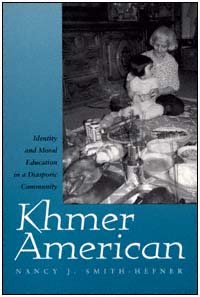 | Title: Khmer American: identity and moral education in a diasporic community Author: Smith-Hefner, Nancy Joan Published: University of California Press, 1999 Subjects: Ethnic Studies | Southeast Asia | American Studies | Education | Cultural Anthropology Publisher's Description: In the early 1980s, tens of thousands of Cambodian refugees fled their war-torn country to take up residence in the United States, where they quickly became one of the most troubled and least studied immigrant groups. This book is the story of that passage, and of the efforts of Khmer Americans to recreate the fabric of culture and identity in the aftermath of the Khmer holocaust.Based on long-term research among Cambodians residing in metropolitan Boston, this rich ethnography provides a vivid portrait of the challenges facing Khmer American culture as seen from the perspective of elders attempting to preserve Khmer Buddhism in a deeply unfamiliar world. The study highlights the tensions and ambivalences of Khmer socialization, with particular emphasis on Khmer conceptions of personhood, morality, and sexuality. Nancy J. Smith-Hefner considers how this cultural heritage influences the performance of Khmer children in American schools and, ultimately, determines Khmer engagement with American culture. [brief] Similar Items |
| 110. |  | Title: Birth as an American rite of passage Author: Davis-Floyd, Robbie Published: University of California Press, 1992 Subjects: Anthropology | Medical Anthropology | Women's Studies | Cultural Anthropology | Medicine | Gender Studies Publisher's Description: Why do so many American women allow themselves to become enmeshed in the standardized routines of technocratic childbirth - routines that can be insensitive, unnecessary, and even unhealthy? And why, in spite of the natural childbirth movement, has hospital birth become even more intensely technologized? Robbie Davis-Floyd argues that these obstetrical procedures are rituals that reflect a cultural belief in the superiority of science over nature. Her interviews with 100 mothers and many health care professionals reveal in detail both the trauma and the satisfaction women derive from childbirth. She also calls for greater cultural and medical tolerance of the alternative beliefs of women who choose to birth at home. [brief] Similar Items |
| 111. | 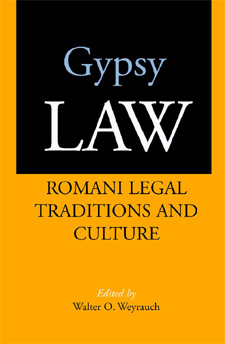 | Title: Gypsy law: Romani legal traditions and culture Author: Weyrauch, Walter O. (Walter Otto) 1919- Published: University of California Press, 2001 Subjects: Law | Cultural Anthropology | Ethnic Studies | Sociology | European Studies | Political Theory Publisher's Description: Approximately one thousand years ago Gypsies, or Roma, left their native India. Today Gypsies can be found in countries throughout the world, their distinct culture still intact in spite of the intense persecution they have endured. This authoritative collection brings together leading Gypsy and non-Gypsy scholars to examine the Romani legal system, an autonomous body of law based on an oral tradition and existing alongside dominant national legal networks. For centuries the Roma have survived by using defensive strategies, especially the absolute exclusion of gadje (non-Gypsies) from their private lives, their values, and information about Romani language and social institutions. Sexuality, gender, and the body are fundamental to Gypsy law, with rules that govern being pure (vujo) or impure (marime) . Women play an important role in maintaining legal customs, having the power to sanction and to contaminate, but they are not directly involved in legal proceedings. These essays offer a comparative perspective on Romani legal procedures and identity, including topics such as the United States' criminalization of many aspects of Gypsy law, parallels between Jewish and Gypsy law, and legal distinctions between Romani communities. The contributors raise broad theoretical questions that transcend the specific Gypsy context and offer important insights into understanding oral legal traditions. Together they suggest a theoretical framework for explaining the coexistence of formal and informal law within a single legal system. They also highlight the ethical dilemmas encountered in comparative law research and definitions of "human rights." [brief] Similar Items |
| 112. | 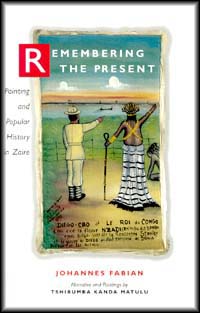 | Title: Remembering the present: painting and popular history in Zaire Author: Fabian, Johannes Published: University of California Press, 1996 Subjects: Anthropology | Cultural Anthropology | Art | African History | Politics | African Studies Publisher's Description: This book combines ethnography with the study of art to present a fascinating new vision of African history. It contains the paintings of a single artist depicting Zaire's history, along with a series of ethnographic essays discussing local history, its complex relationship to forms of self-expression and self-understanding, and the aesthetics of contemporary urban African and Third World societies. As a collaboration between ethnographer and painter, this innovative study challenges text-oriented approaches to understanding history and argues instead for an event- and experience-oriented model, ultimately adding a fresh perspective to the discourse on the relationship between modernity and tradition.During the 1970s, Johannes Fabian encouraged Tshibumba Kanda Matulu to paint the history of Zaire. The artist delivered the work in batches, together with an oral narrative. Fabian recorded these statements along with his own question-and-answer sessions with the painter. The first part of the book is the complete series of 100 paintings, with excerpts from the artist's narrative and the artist-anthropologist dialogues. Part Two consists of Fabian's essays about this and other popular painting in Zaire. The essays discuss such topics as performance, orality, history, colonization, and popular art. [brief] Similar Items |
| 113. | 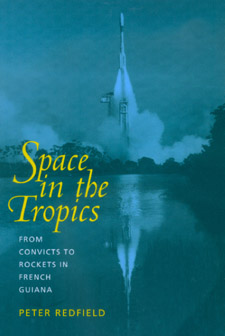 | Title: Space in the tropics: from convicts to rockets in French Guiana Author: Redfield, Peter 1965- Published: University of California Press, 2000 Subjects: Anthropology | Cultural Anthropology | Geography | French Studies | European Studies | Technology Publisher's Description: Rockets roar into space - bearing roughly half the world's commercial satellites - from the same South American coastal rainforest where convicts once did time on infamous Devil's Island. What makes Space in the Tropics enthralling is anthropologist Peter Redfield's ability to draw from these two disparate European projects in French Guiana a gleaming web of ideas about the intersections of nature and culture. In comparing the Franco-European Ariane rocket program with the earlier penal experiment, Redfield connects the myth of Robinson Crusoe, nineteenth-century prison reform, the Dreyfus Affair, tropical medicine, postwar exploration of outer space, satellite technology, development, and ecotourism with a focus on place, and the incorporation of this particular place into greater extended systems. Examining the wider context of the Ariane program, he argues that technology and nature must be understood within a greater ecology of displacement and makes a case for the importance of margins in understanding the trajectories of modern life. [brief] Similar Items |
| 114. |  | Title: Abuses Author: Lingis, Alphonso 1933- Published: University of California Press, 1994 Subjects: Philosophy | Literature | Cultural Anthropology | Social and Political Thought | Psychology | Travel Publisher's Description: Part travelogue, part meditation, Abuses is a bold exploration of central themes in Continental philosophy by one of the most passionate and original thinkers in that tradition writing today.A gripping record of desires, obsessions, bodies, and spaces experienced in distant lands, Alphonso Lingis's book offers no less than a new approach to philosophy - aesthetic and sympathetic - which departs from the phenomenology of Levinas and Merleau-Ponty. "These were letters written to friends," Lingis writes, "from places I found myself for months at a time, about encounters that moved me and troubled me. . . . These writings also became no longer my letters. I found myself only trying to speak for others, others greeted only with passionate kisses of parting."Ranging from the elevated Inca citadel of Machu Picchu, to the living rooms of the Mexican elite, to the streets of Manila, Lingis recounts incidents of state-sponsored violence and the progressive incorporation of third-world peoples into the circuits of exchange of international capitalism. Recalling the work of such writers as Graham Greene, Kathy Acker, and Georges Bataille, Abuses contains impassioned accounts of silence, eros and identity, torture and war, the sublime, lust and joy, and human rituals surrounding carnival and death that occurred during his journeys to India, Bangladesh, Thailand, Bali, the Philippines, Antarctica, and Latin America. A deeply unsettling book by a philosopher of unusual imagination, Abuses will appeal to readers who, like its author, "may want the enigmas and want the discomfiture within oneself." [brief] Similar Items |
| 115. | 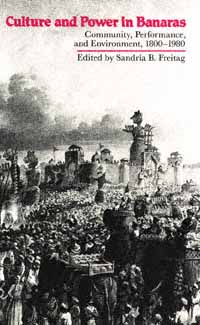 | Title: Culture and power in Banaras: community, performance, and environment, 1800-1980 Author: Freitag, Sandria B Published: University of California Press, 1989 Subjects: Asian Studies | South Asia | Asian History | Cultural Anthropology | Postcolonial Studies Publisher's Description: This collection of ten essays on Banaras, one of the largest urban centers in India's eastern Gangetic plain, is united by a common interest in examining everyday activities in order to learn about shared values and motivations, processes of identity formation, and self-conscious constructions of community. Part One examines the performance genres that have drawn audiences from throughout the city. Part Two focuses on the areas of neighborhood, leisure, and work, examining the processes by which urban residents use a sense of identity to organize their activities and bring meaning to their lives. Part Three links these experiences within Banaras to a series of "larger worlds," ranging from language movements and political protests to disease ecology and regional environmental impact. Banaras is a complex world, with differences in religion, caste, class, language, and popular culture; the diversity of these essays embraces those differences. It is a collection that will interest scholars and students of South Asia as well as anyone interested in comparative discussions of popular culture. [brief] Similar Items |
| 116. | 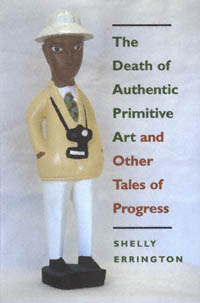 | Title: The death of authentic primitive art and other tales of progress Author: Errington, Shelly 1944- Published: University of California Press, 1998 Subjects: Anthropology | Cultural Anthropology | Art History | Architectural History | Art Theory Publisher's Description: In this lucid, witty, and forceful book, Shelly Errington argues that Primitive Art was invented as a new type of art object at the beginning of the twentieth century but that now, at the century's end, it has died a double but contradictory death. Authenticity and primitivism, both attacked by cultural critics, have died as concepts. At the same time, the penetration of nation-states, the tourist industry, and transnational corporations into regions that formerly produced these artifacts has severely reduced supplies of "primitive art," bringing about a second "death."Errington argues that the construction of the primitive in the nineteenth and twentieth centuries (and the kinds of objects chosen to exemplify it) must be understood as a product of discourses of progress - from the nineteenth-century European narrative of technological progress, to the twentieth-century narrative of modernism, to the late- twentieth-century narrative of the triumph of the free market. In Part One she charts a provocative argument ranging through the worlds of museums, art theorists, mail-order catalogs, boutiques, tourism, and world events, tracing a loosely historical account of the transformations of meanings of primitive art in this century. In Part Two she explores an eclectic collection of public sites in Mexico and Indonesia - a national museum of anthropology, a cultural theme park, an airport, and a ninth-century Buddhist monument (newly refurbished) - to show how the idea of the primitive can be used in the interests of promoting nationalism and economic development.Errington's dissection of discourses about progress and primitivism in the contemporary world is both a lively introduction to anthropological studies of art institutions and a dramatic new contribution to the growing field of cultural studies. [brief] Similar Items |
| 117. | 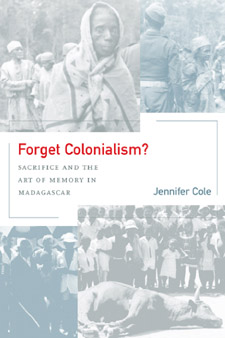 | Title: Forget colonialism?: sacrifice and the art of memory in Madagascar Author: Cole, Jennifer 1966- Published: University of California Press, 2001 Subjects: Anthropology | African Studies | Geography | African History | Cultural Anthropology | Postcolonial Studies Publisher's Description: While doing fieldwork in a village in east Madagascar that had suffered both heavy settler colonialism and a bloody anticolonial rebellion, Jennifer Cole found herself confronted by a puzzle. People in the area had lived through almost a century of intrusive French colonial rule, but they appeared to have forgotten the colonial period in their daily lives. Then, during democratic elections in 1992-93, the terrifying memories came flooding back. Cole asks, How do once-colonized peoples remember the colonial period? Drawing on a fine-grained ethnography of the social practices of remembering and forgetting in one community, she develops a practice-based approach to social memory. [brief] Similar Items |
| 118. |  | Title: Where the world ended: re-unification and identity in the German borderland Author: Berdahl, Daphne 1964- Published: University of California Press, 1999 Subjects: Anthropology | Cultural Anthropology | German Studies | Geography | European Studies | Social Problems Publisher's Description: When the Berlin Wall fell, people who lived along the dismantled border found their lives drastically and rapidly transformed. Daphne Berdahl, through ongoing ethnographic research in a former East German border village, explores the issues of borders and borderland identities that have accompanied the many transitions since 1990. What happens to identity and personhood, she asks, when a political and economic system collapses overnight? How do people negotiate and manipulate a liminal condition created by the disappearance of a significant frame of reference?Berdahl concentrates especially on how these changes have affected certain "border zones" of daily life - including social organization, gender, religion, and nationality - in a place where literal, indeed concrete, borders were until recently a very powerful presence. Borders, she argues, are places of ambiguity as well as of intense lucidity; these qualities may in fact be mutually constitutive. She shows how, in a moment of headlong historical transformation, larger political, economic, and social processes are manifested locally and specifically. In the process of a transition between two German states, people have invented, and to some extent ritualized, cultural practices that both reflect and constitute profound identity transformations in a period of intense social discord. Where the World Ended combines a vivid ethnographic account of everyday life under socialist rule and after German reunification with an original investigation of the paradoxical human condition of a borderland. [brief] Similar Items |
| 119. | 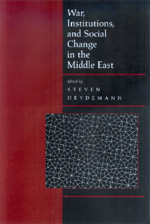 | Title: War, institutions, and social change in the Middle East Author: Heydemann, Steven Published: University of California Press, 2000 Subjects: Politics | Middle Eastern Studies | Middle Eastern History | Postcolonial Studies | Cultural Anthropology Publisher's Description: Few areas of the world have been as profoundly shaped by war as the Middle East in the twentieth century. Despite the prominence of war-making in this region, there has been surprisingly little research investigating the effects of war as a social and political process in the Middle East. To fill this gap, War, Institutions, and Social Change in the Middle East brings together an international and interdisciplinary group of scholars who explore the role of war preparation and war-making on the formation and transformation of states and societies in the contemporary Middle East. Their findings pose significant challenges to widely accepted assumptions and present new theoretical starting points for the study of war and the state in the contemporary developing world. Heydemann's collaborators include political scientists, historians, anthropologists, and sociologists from the Middle East, Europe, and the United States. Their essays are both theoretically sophisticated and empirically rich, covering topics such as the effects of World War II on state-market relations in Syria and Egypt, the role of war in the rise of the Palestine Liberation Organization, the political economy of Lebanese militias, and the effects of the 1967 war on state and social institutions in Israel. The volume originated as a research planning project of the Joint Committee on the Near and Middle East of the Social Science Research Council. [brief] Similar Items |
| 120. | 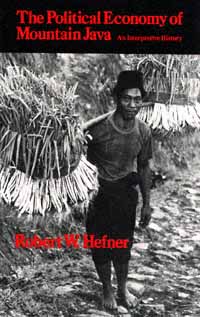 | Title: The political economy of mountain Java: an interpretive history Author: Hefner, Robert W 1952- Published: University of California Press, 1990 Subjects: Anthropology | Asian History | Sociology | Cultural Anthropology | Southeast Asia | Politics Similar Items |